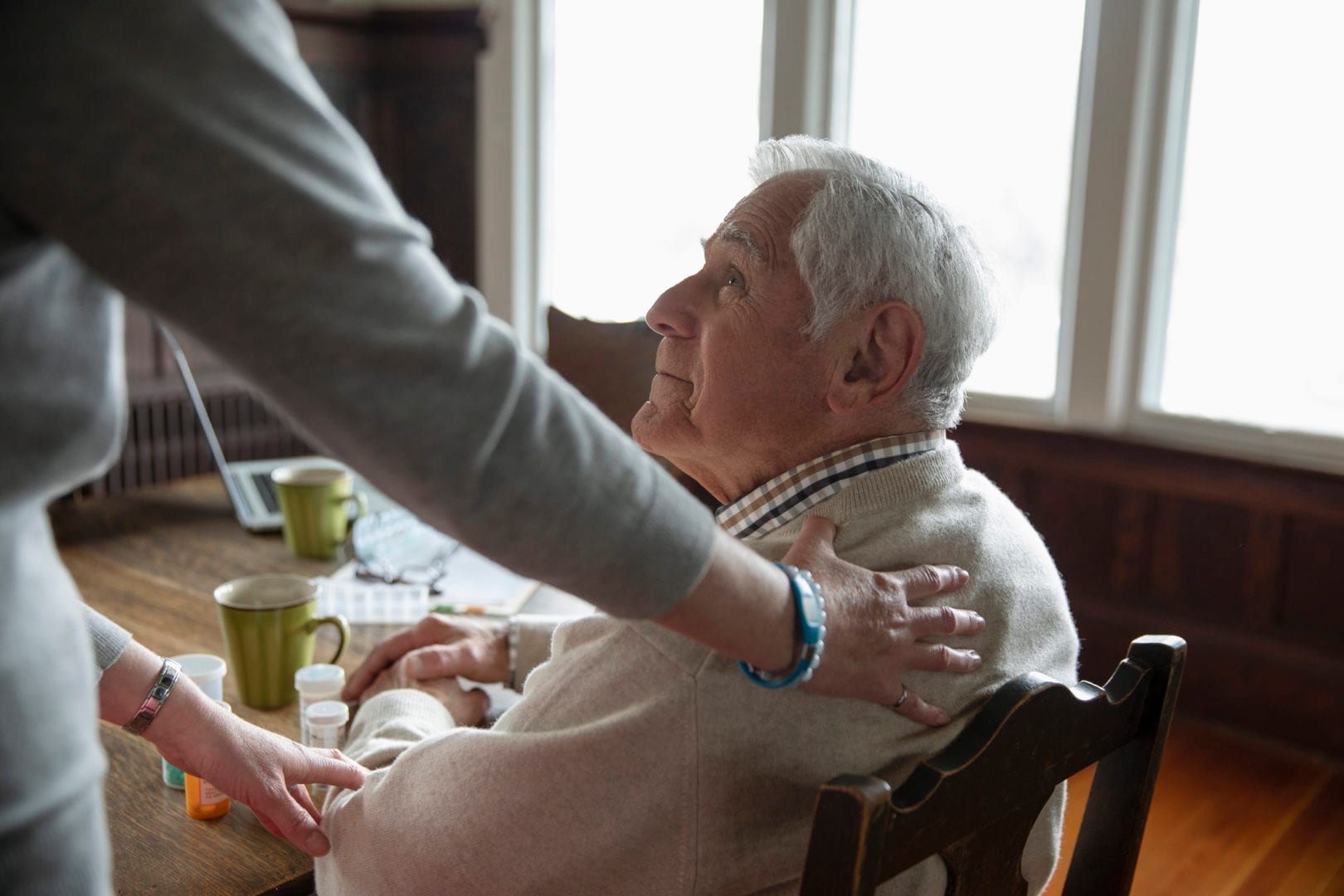It’s normal to have first-day-on-the-job jitters. For in-home senior caregivers, especially, it’s not like you’re entering a predictable office environment. You’re essentially going into the home of a stranger, where all sorts of unknowns could unravel.
Showing up in someone’s personal space and being unsure of what you’re walking into can be an uncomfortable situation for both the client and the caregiver, says Amy Fuchs, an independent elder care consultant and owner of the Elder Expert LLC in Saddle River, New Jersey.
However, if you can be subtle and gracious, rather than coming on too strong, and you make an open-minded effort to get to know your client and their needs from the get-go, you’re more likely to start building a healthy working relationship from Day One, she says. Use these expert tips to help your first day as a senior caregiver go as smoothly as possible.
1. Get to know the person in advance
Coming prepared with some knowledge of the person can help reduce first-day awkwardness and surprises says Dan Kastner, a former caregiver and current staff coordinator at Aware Senior Care in Cary, North Carolina.
Find out what tasks they want help with, if they’re looking for personal care or more companion care, what their expectations are and what qualities they’re looking for in a caregiver, Kastner says. Agencies like Kastner’s do a thorough assessment of clients and pass this information onto their caregivers before they start working with a new senior. If you work for yourself, ask the client and/or their family members questions before your first day on the job.
“…be flexible and bring your professional presence. But it’s also important to be warm and empathetic and to bring that love and joy.”
— Dan Kastner, caregiver and staff coordinator at Aware Senior Care
2. Arrive with the right attitude
The best way to approach a new senior caregiving job is to show up with a fresh perspective, be present and listen to the client and any family members who are involved. Kastner says the best caregivers go in with a “student” attitude and act like a sponge: They sit down and listen. They’re “warm, compassionate and empathetic.”
“As a professional, you have to leave everything at the door, and be flexible and bring your professional presence,” he says. “But it’s also important to be warm and empathetic and to bring that love and joy.”
3. Approach each person with kindness, dignity and respect
It’s important to keep in mind that you’re there to help with more than just the client’s physical or mental needs, says Barbara Schuh, vice president of franchise operations for Home Care Assistance, a senior caregiving agency headquartered in San Francisco.
Her agency champions taking a holistic approach to understanding client’s needs, including emotional and spiritual. So, in addition to helping with daily tasks, they look at how they can improve the client’s entire quality of life, including diet and sense of wellbeing.
“Approach the client from a place of [knowing] they’ve had full lives and you’re there to help them in this phase of their life,” she says. “Their physical or mental disabilities or limitations do not define who they are as people.”
And while you may have worked with a multitude of clients, it’s important to keep in mind that this may be the family’s first time having a caregiver in their home, Fuchs says. Because this is a brand new experience for so many clients, it’s best to approach the situation as though you are a guest in their home, she says.
4. Carefully navigate family dynamics
Pay attention to how the patient and their family members interact. “There’s a specific dynamic that’s unique to each home,” Fuchs says. “It’s very important to adjust and to assess each home’s dynamic.”
In many cases, you may be going into a home where there is one healthy spouse and one ill spouse, points out Fuchs. If you are working with someone who is married, pay attention to the dynamic between the two spouses. Often it’s the well spouse who really needs your support, she explains, and it’s not uncommon for the ill spouse to be resistant to help. In that scenario, it helps to emphasize that you’re there to help the well spouse, too.
Fuchs recently encountered this situation, where a patient had dementia and didn’t understand why she, the caregiver, was there: “I said, ‘I’m just here to help your husband, his back hurts.’ It’s really understanding if the person has cognitive impairments, you need to come up with strategies to help ingratiate yourself with both parties.”
Additionally, if the couple still sleeps in the same bedroom, be aware of privacy and respect any boundaries, Fuchs says. If you’re unsure how to handle it, ask.
You may also be interacting with the client’s adult children.
“Sometimes the adult children are more of an impediment to the care of the client, so sometimes it’s about managing those relationships,” Schuh says. “It’s about being respectful and feeling them out, and asking the adult child what they want to do and what their expectations are.”
“It’s very important to hear directly from the family what specifically they’re looking for, because the worst thing is to assume without getting complete, accurate information.”
— Amy Fuchs, independent elder care consultant and owner, Elder Expert LLC
5. Ask questions
If you’re an experienced caregiver, you may have a knack for intuitively knowing what needs to be done in any given situation. But assuming you know what a senior or their family needs can create problems, especially if there’s a discrepancy between their expectations and what you think they need, points out Fuchs. Even if you covered it before you started or on your first day, you should explicitly ask the client (or if they have cognitive impairments, their participating family members).
“This could be just sitting down at the kitchen table and asking them what their needs are, how you can help, and hearing from them how they can help rather than assuming you already know what needs to be done,” she says. “It’s very important to hear directly from the family what specifically they’re looking for, because the worst thing is to assume without getting complete, accurate information.”
Fuchs recommends asking these starter questions to help build rapport and ensure success:
- Do you have any other family members nearby?
- What is your daily routine and schedule?
- What can I help with?
- How can I make your life better, or how can I improve on your life?
- What do you enjoy doing? What are your passions? What brings you joy?
In addition to asking the practical questions, it’s also smart to ask one another questions to get to know each other on a deeper level, Schuh says.
Strive for honest and transparent communication, says Schuh. This way, they’ll feel heard and can lead the way. “Give them the dignity to decide what they want that caregiver to do; this is their life,” she says.
6. Ask for feedback at the end of the day
As the day winds to a close, take a few minutes to check in with your client or their family and get feedback on how they feel the first day went and see if it matches with your thinking.
Schuh suggests sitting down and saying, “This was our first shift; how do you think it went? Is there anything you’d like me to do differently?”
Kastner also recommends asking, “Is there anything else I can do before I leave today?”
If your first day didn’t go as smoothly as you’d hoped, don’t fret. “Rapport is not going to happen on day one,” says Schuh. “But it builds up over time if you continue to have open and honest dialogue.”


